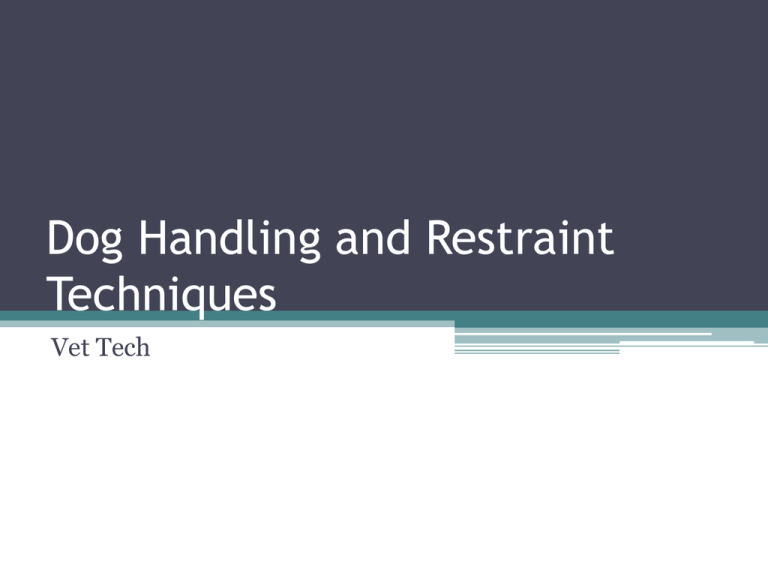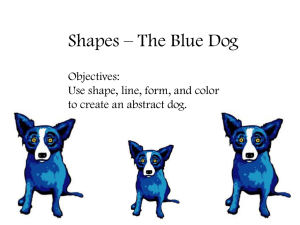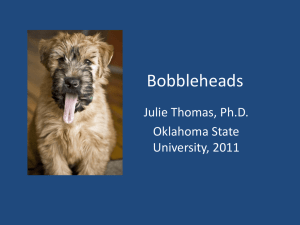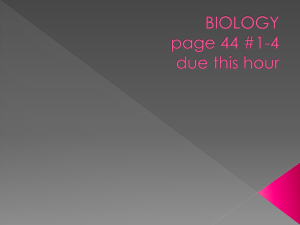Dog Handling and Restraint Techniques
advertisement

Dog Handling and Restraint Techniques Vet Tech After the completion of this lesson students will be able to… • • • • Catch a dog with a snare Carrying an injured dog, both small and large. Muzzle a dog, both normal and short nosed. Describe the proper way to administer medication (liquid and pill) • Determine the use of and proper methods of lateral, sternal and standing restraint. • Describe proper procedures for taking a rectal temperature. • Describe proper procedures for using an Elizabethan collar. General Safety Procedures • Wear protective clothing when working with animals. • Before handling any animal, make sure it is up to date all on VX, especially rabies. • Make sure to put your safety first and the animal’s second! • If bitten or scratched return the animal to its cage, then clean the wound with soap and water. Reasons for restraint • To control an animal for treatment or examination. • To prevent the animal form harming itself. • To prevent the animal from harming the people who are treating it. Before you restrain… • As a general rule begin with the minimal restraint necessary and proceeded from there. • Observe the dog for signs of fear or aggression. • Approach and handle all dogs slowly and gently and talk with a soothing tone of voice! Catch a Dog with a snare • • To use the snare place the loop over the dog’s head and pull the handle a the opposite end until the loop becomes snug around its neck. • A snare a.k.a rabies pole • Permits handler to lead the dog from a safe distance. Carrying a Small Injured Dog • 1. Place you right hand under the dog’s body with your index finer between the forelegs. • 2. Lift the dog so that its body is supported by your hip and hold firmly by your right • 3. Hold the scruff to help further restrain the head. Carrying a large dog • “scoop” method • 1. kneel and completely surround the dog with both arms. • 2. Return to standing position. • Remember to lift with your knees not your back! Using an “E collar” • Elizabethan collar • Commonly used to keep a dog from chewing or licking wounds or incisions. • Needs to be light and flexible • The dog may be able to still bite! Muzzling a normal dog • Make a loop in the center of a 4ft piece of bandage. Tie a “x” knot in the center and slip it over the dog’s muzzle. • Bring the ends together under the chin and loop the ends through each other. • Tie the two loose ends in a bow behind the dog’s head. Muzzling a Brachiocephalic Dog • Complete the same process as described for a normal dog. • Then, to relieve pressure of the nose loop on the nasal passage, pass on of the ends under the loop on the dog’s muzzle and pull it tight. • Then ties ends at the back of the head with a bow. • Brachiocephalic = short nosed Administering medication • First try to get the dog to take the pill on its own. • 1. Grasp the jaw with the lips folded inward. Gently pull upward on the top jaw. • 2. While holding down the lower jaw place the pill as far back as possible on the tongue. • Hold the mouth shut till the dog swallows the pill. You may need to massage the throat. Lateral Recumbency • Start with the dog in standing position. • Reach over the back and gently grasp the legs and pull the dogs body toward you. • DO NOT DROP THE DOG • Once the dog is down grasp the forelegs in one hand and the hind legs in the other. • Restrain the neck with the arm that is holding the forelegs by pressing on the base of the skull. Sternal Recumbency • Most commonly used for IV injections. • Lay the dog down on its belly with the forelegs stretched forwards. • Hold the dog’s head with one arm • With the other arm reach over the dog’s back and grasp the opposite foreleg. • Gently apply your weight to the dog’s back to prevent movement. Standing position • This type of restraint is most commonly used for a physical exam or while administering a vx • Allow the dog to stand on the examination table and slip one arm around the dog’s neck. • Pass you other arm under the animal’s body between the two sets of legs and pull the body firmly against yours.








